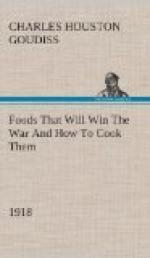Vegetables are wasted in preparation by too thick paring, the discarding of coarse leaves such as are found on lettuce, cabbage and cauliflower, discarding wilted parts which can be saved by soaking, throwing away tips and roots of celery and the roots and ends of spinach and dandelions. All these waste products can be cooked tender, rubbed through a sieve and used with stock for vegetable soup, or with skimmed milk for cream soup. Such products are being conserved by the enemy, even to the onion skin, which is ground into bread-making material.
Throwing away the water in which vegetables have been cooked wastes their characteristic and valuable element—the mineral salts. Cooking them so much that they become watery; under-cooking so that they are hard and indigestible; cooking more than is required for a meal; failing to use left-over portions promptly as an entree or for cream soups or scalloped dishes—all these things mean an appalling waste of valuable food material. Good food material is also lost when the water in which rice or macaroni or other starchy food has been boiled is poured down the kitchen sink. Such water should be used for soup making.
Fruits are wasted by throwing away the cores and skins, which can be used for making sauces, jams and jellies, the latter being sweetened with corn syrup instead of sugar.
Rhubarb is wasted by removing the pink skin from young rhubarb, which should be retained to add flavor and color-attractiveness to the dish.
Raw food in quantity is frequently left in the mixing bowl, while by the use of a good flexible knife or spatula every particle can be saved. A large palette knife is as good in the kitchen as in the studio.
* * * * *
The next step in food preparation is cooking, and tons of valuable material are wasted through ignorance of the principles of cooking.
Bad cooking, which means under-cooking, over-cooking or flavorless cooking, renders food inedible, and inedible food contributes to world shortage. Fats are wasted in cooking by being burned and by not being carefully utilized as dripping and shortening. The water in which salt meat, fresh meat, or poultry has been boiled should be allowed to cool and the fat removed before soup is made of it. Such fat can be used, first of all, in cooking, and then any inedible portions can be used in soap making.
* * * * *
Tough odds and ends of meat not sightly enough to appear on the table are often wasted. They can be transformed by long cooking into savory stews, ragouts, croquettes and hashes, whereas, if carelessly and insufficiently cooked, they are unpalatable and indigestible. Scraps of left-over cooked meat should be ground in the food-chopper and made into appetizing meat balls, hashes or sandwich paste. If you happen to have a soft cooked egg left over, boil it hard at once. It can be used for garnishes, sauces, salads or sandwich paste.




